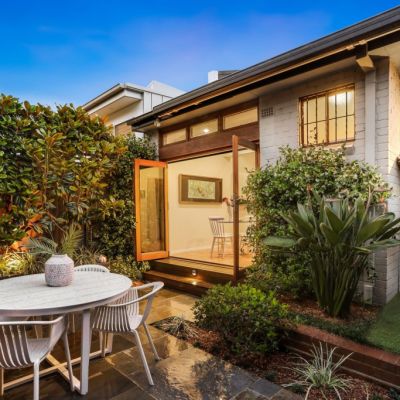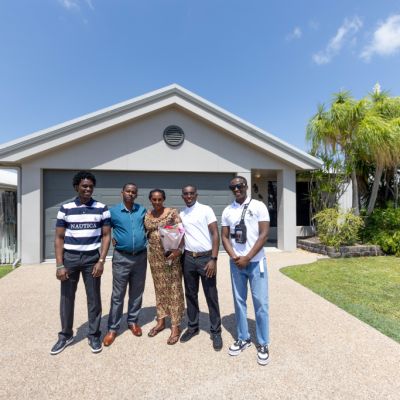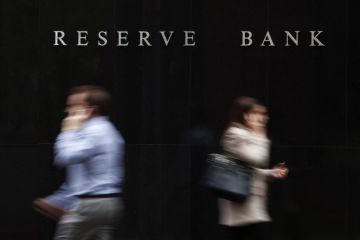The graph that shows how buying a house just got even further out of reach
Australian property prices weren’t supposed to be this high by now, as soaring mortgage repayments should have meant buyers could borrow less and spend less at auction.
Sydney house prices have risen almost back to their peak, Melbourne prices have been rising for two quarters, and prices are up in almost every other capital city in the September quarter, Domain’s latest House Price Report, released on Thursday, shows.

Why? While population growth is often highlighted, another reason is that property buyers are increasingly purchasing with wealth made in the property market – whether their own or their parents’ or grandparents’ – rather than with wages.
The Bank of Mum and Dad is notoriously hard to measure, but visible on auction floors every weekend as many buyers walk away with the keys thanks to family backing.
Many receive large sums to help with purchases, including when they upgrade, while elsewhere entire homes are paid for.
The assistance comes after years of successive property booms pushed dwelling prices up faster than wages. Since 2012, average wages have risen about 30 per cent, on ABS data. Dwelling prices across the capital cities have jumped close to 90 per cent – and last year’s falls were short-lived.
When bank economists predicted a property price downturn last year of about 15 per cent to 20 per cent – it was ultimately shallower – they were modelling wages and the cost of mortgage repayments. Economists have scant detail about the size of the Bank of Mum and Dad, whether cash gifts, guarantees or inheritances.
There is a growing, albeit patchwork, body of evidence that suggests how sorely outside help is needed to achieve home ownership, especially within commuting distance of the two major capitals.
 Australia’s property market has almost fully recovered from the downturn and nearing pandemic record highs
Australia’s property market has almost fully recovered from the downturn and nearing pandemic record highs How has Australia’s property market bounced back while interest rates and the cost of living are so high?
How has Australia’s property market bounced back while interest rates and the cost of living are so high? Would you buy a house for your parents? These two young brothers did, after growing up in refugee camps
Would you buy a house for your parents? These two young brothers did, after growing up in refugee camps
Curtin University research found about nine in 10 potential first home buyers would not be able to save a deposit and/or meet mortgage repayments. A University of Sydney paper found a gift of $10,000 or more could increase the likelihood of a first home purchase by about 90 per cent.
Two in five young adults expect they will receive family help to buy their first home, another University of Sydney study found.
The Productivity Commission found the total amount of wealth transfers made in 2018 was $120 billion, 90 per cent of which are inheritances.
Some long-term home owners have been able to sell the family home, downsize to a smaller place, pay cash and pocket the difference. A quarter of residential property sales were bought in cash in 2022, noticeably in prestige suburbs.
For those without family help, the government rolled out a low-deposit scheme, although it comes with the risk of negative equity. A third of first-time buyers over the past year used the scheme.
Grattan Institute economic policy program director Brendan Coates said while much larger-than-expected population growth, thanks to high immigration numbers, has boosted the property market this year, the other factor was intergenerational wealth.
“People are less sensitive to interest rates if people are relying on family money to get into the market,” Coates said. “If that’s what’s driving prices that’s really concerning – it implies a growing divide between haves and have-nots.”
He said while there was no clear data to measure the extent, it was a factor in driving housing inequality.
”It’s part of the dynamic of worsening wealth inequality in Australia. It’s very hard to buy a home without family support, particularly in a major city and somewhere with access to jobs and transport.”
Apart from some insights from lending data and anecdotal evidence, banks do not measure and model the Bank of Mum and Dad into their forecasts – a blind spot in this year’s unexpected recovery.
Westpac senior economist Matthew Hassan said it was possible that family help was driving the recovery.
“But it’s hard to confirm. There is a substantial portion of purchasers who are from unencumbered buyers, who don’t need money at all, using the proceeds of the family home and that can be up to 25 per cent of purchases,” he said.
“It’s possible we’ve seen a significant lift in inheritance activity and may have helped the housing market, it’s most likely to be a factor.”
Commonwealth Bank of Australia head of Australian economics Gareth Aird also said while the growth in population was underpinning the property market, it was not clear how much cash buyers were fuelling price gains.
“I don’t know exactly how much cash is coming into the market because there isn’t data on that. You generally hear anecdotes that on the margins it pushes up demand,” he said.
“We just don’t know how big the Bank of Mum and Dad is. It is going to be a dynamic that’s going to be around for a while as Baby Boomers retire. They may choose to gift their children a lump sum to secure at least the deposit anyway.
“If parents have got the money to help their children it’s better to do it sooner rather than later.”
We thought you might like
States
Capital Cities
Capital Cities - Rentals
Popular Areas
Allhomes
More







